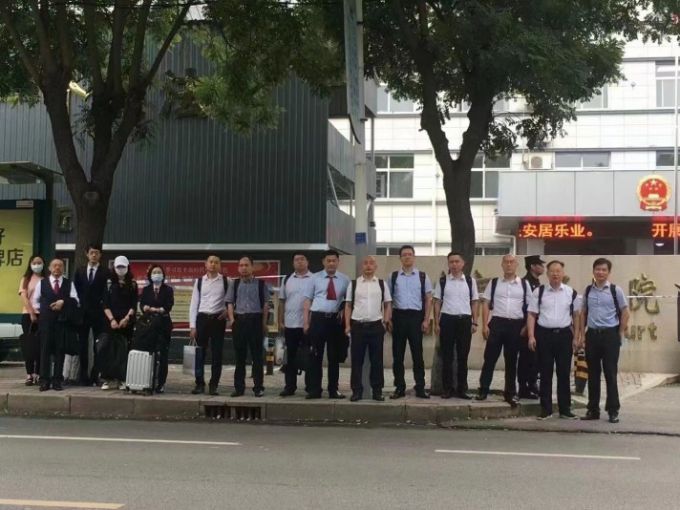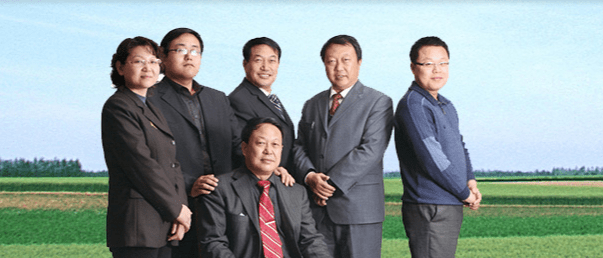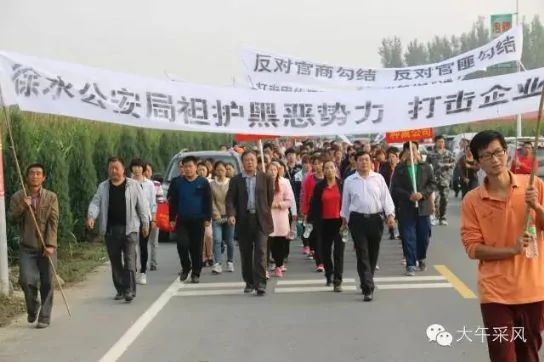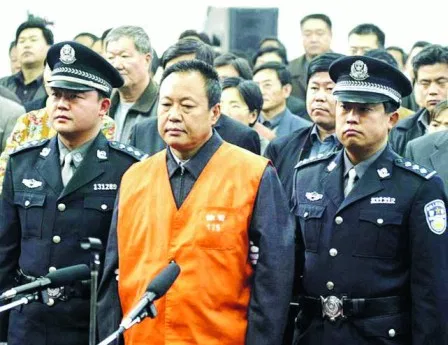2021年7月15日上午9时,大午案在河北省高碑店市法院开庭审理。为回应各界关切,就第一日庭审情况介绍如下:
一、大午案预计开庭时长?
高碑店市法院送达给辩护律师的《开庭通知书》及张贴在法院门外的《开庭公告》,均未列明本次庭审起止时间。因本案涉及348册卷宗,证据材料众多,且控辩双方对事实定性、法律适用争议较大,孙大午本人及多名被告人亦坚称自己无罪,坚决要求辩护人进行无罪辩护。就目前庭审进度来看,大午案庭审预计时长至少在30日以上。
二、大午案是否开放旁听,旁听情况如何?
大午案虽名为公开审理,但实仍限制旁听。各被告人家属直至开庭前一日方接到高碑店法院通知:每位被告人仅允许一名家属参与旁听;因大午集团系本案被告单位,允许10名工作人员旁听。大午集团目前约有9000名员工,高碑店法院却仅开放10个旁听名额,能够参与旁听比例仅为1/900。
而即便仅有30名家属及工作人员可以取得旁听证,他们仍被高碑店市人民法院以防控疫情、场地限制为由,被安排在其他法庭,只能通过视频旁听庭审情况。大部分家属反映视频旁听存在画面不清晰、声音时断时续等问题。
有辩护律师就视频旁听问题提出异议,要求安排旁听人员直接在庭审现场旁听,被法庭直接驳回。
三、孙大午及其他被告人状态如何?
孙大午等20名被告人普遍身体情况较差,数位辩护人曾据此依法提出取保候审申请。庭前会议召开时,也曾出现多名被告人因体力不支,无法全程参与的情况。今日庭审过程中,亦有两名被告人因身体不适,先后离开法庭、接受医疗救治。
7月15日是孙大午的农历生日,大午本人状态良好,但对于第一审判庭旁听席无旁听群众提出了质疑,称:“虽然我们一家都进来了,但还有亲家、还有其他亲戚、还有员工,怎么都没见呢?我就想问问这个案子到底是不是公开审判?”表现出了对于本案能否得到公正审理的担忧。
四、孙大午等人的女眷是否已并案处理、一并开庭?
未并案处理、未一并开庭。孙大午妻子刘会茹、两儿媳张媛、马晓晨等女眷涉嫌非法吸收公众存款罪等一案,已于2021年7月1日被高碑店市人民检察院退回高碑店市公安局补充侦查。女眷大多仅涉及非法吸收公众存款罪一罪,所谓的“犯罪行为”也仅限于向大午集团提供了个人银行账号,根本不构成犯罪。高碑店检察院此举无疑是为应对辩护人提出的并案处理,事实上仍将女眷作为“人质”。
五、第一日庭审主要内容及进度如何?
宣布开庭后,审判长告知诉讼权利,并称管辖问题和回避问题已经在庭前会议中做出决定,仅询问了四位未参加庭前会议的辩护人有无回避事由,张磊律师和朱孝顶律师以法庭未能做到真正的公开审判为由申请合议庭法官回避,以公诉人提前介入案件侦查活动,依据最高人民检察院刑事诉讼规则第三十五条规定不得再担任公诉人提出回避申请。后又有多位辩护律师以合议庭法官在处理本案的程序问题存在明显违反法律规定、不保障当事人诉讼权利等事由申请回避。整个上午基本上都是辩护律师在陈述合议庭法官、公诉人应当回避的理由。
下午,一开庭,合议庭即以辩护律师上午所提回避申请不属于刑事诉讼法第二十九条第三十条规定的回避事由直接宣布驳回并不得申请复议。
公诉人宣读起诉书后,审判长宣布了对于庭前会议中相关程序性事项的决定,除依据辩护人申请调取了部分新的证据之外,基本上驳回了所有的辩护律师所有的申请,包括排除非法证据、通知证人、鉴定人、侦查人员到庭等。
针对合议庭宣布的庭前会议事项的决定,辩护律师依法争取了再次发表意见的机会,多名辩护律师针对法庭决定不排除非法证据的决定发表了强烈异议,主要问题集中在孙大午等七人被指定监视居住期间所形成的讯问笔录是否应当作为非法证据排除,多名辩护律师的主要理由是:1、保定市公安局通过指定管辖制造了当事人在高碑店市没有固定住所的情形,然后就认为达到了刑事诉讼法第七十五条规定的可以适用指定居所监视居住的“无固定住所”的条件,这在本案中完全是恶意的钻法律空子的行为,是有意通过公安部门的一纸指定管辖,就废除了刑事诉讼法的人权保障条文。多位辩护人认为本案的所谓指定居所监视居住实质上就是非法拘禁,属于以非法拘禁等非法方法限制人身自由的方式获取被告人供述,属于应当排除的非法证据;2、本案七名被指定监视居住的被告人在指定居所监视居住期间所遭受到的对待,本身就是一种酷刑,整个监视居住,就是对当事人的一种肉刑,实际上也给多名被告人造成了难以忍受的痛苦,其中孙大午对此的说法非法形象具体也非常具有代表性,那就是说指定居所监视居住让孙大午“生不如死”。如果生不如死,还不是应当排除非法证据的情形,那什么才能是?合议庭法官怎么可以在这种情形之下,仍然对证据取得的合法性“没有疑问”。
多名辩护律师强烈要求法庭应当当庭进行排除非法证据的调查,并且通过排除非法证据的调查程序,将遭受指定居所监视居住之严重不人道酷刑的被告人的讯问笔录排除出法庭。
另有多名辩护人提到当事人在会见时告诉律师,公安侦查人员对他们进行了诱骗,比如孙大午,侦查人员曾告知他,涉及的都是单位的事情,他本人没事,过年就可以到大午家一起喝酒;比如孙萌,侦查人员骗他很快就可以出去管辖企业,让他认罪认罚。
第一日庭审于7月15日18时45分结束,明日九时继续开庭。
六、法庭之外情况如何?
相比庭前会议时整条街的戒严管制,此次开庭时未对市政街道进行交通管辖,但是各种便衣人员布满了法院外面的整条街道,有媒体记者前往采访,被相关部门人员直接“礼送”出了河北省界。孙大午本人也十分关注庭外情况,曾当庭询问法庭是否允许媒体旁听及采访,法庭没有回答孙大午的此一询问。
七、本案辩护律师是否受到了“特殊关照”?
各辩护律师接到大午案开庭通知后,即收到所属司法部门的约谈通知。开庭前三日,各地司法部门陆续派员前往高碑店市,约见辩护律师;个别地方甚至派遣区、市、省三级司法部门工作人员全程参与旁听,监督律师庭审活动,假借保障辩护权之名,实为向辩护人施压。
八、目前大午集团经营情况如何,是否仍处于政府接管状态?
目前,大午集团仍处于政府接管之中,经营状况已大不如前。政府工作小组掌握大午集团的人事权、财产权、决策权,拒绝向集团辩护人、孙大午等人的辩护律师支付委托费用。因大部分被告人家属财产被查封、扣押、冻结,无法保障基本生活条件,迫于无奈向集团借款度过难关亦被拒绝。
九、据传开庭前曾有司法工作人员动员被告人家属解除外地律师,是否属实?
据本案部分家属反映,开庭前确曾有司法工作人员以“解除外地律师、就能办理取保候审”为沟通筹码,积极动员当事人解聘外地律师,接受法院指定的法律援助律师。对此,数位辩护律师当庭提出:若能给自己所代理的被告人办理取保候审或出具可以缓刑的认罪认罚量刑建议书,自愿即刻退出本案辩护工作。
十、2021年7月12日,徐水区人民政府发布了《徐水区大午康养小镇控制性详细规划》,对本案是否有影响?
《徐水区大午康养小镇控制性详细规划》将大午城定位为集居住康养、文化教育、商业服务功能于一体的康养小镇,明确保留大午幼儿园、大午体育馆、孙氏文化园等公共服务设施,规划保留温泉酒店等商业服务业设施,并对康养小镇发展提出了新展望。《详细规划》的出台,在某种程度上,意味着高碑店市人民检察院此前所指控的所谓非法占用农用地部分,已然合法化;徐水区政府对于温泉项目、桶装水厂的规划保留、发展,意味着对于大午集团开采地热、矿泉水资源的合法性追认。
但在大午集团被政府全面接管之后、庭审之前发布此规划,意图何在?是否对案件的处理产生影响,产生何种影响,外人尚未可知。
明日待续。
大午案法律团队
2021年7月15日

At 9 a.m. on July 15, 2021, the trial of the Dawu case commenced at Gaobeidian Municipal Court in Hebei Province. To answer the wide range of concerns coming from the public, we providing the following briefing:
1. How long do you expect the Dawu trial to last?
Neither the trial notice that the court sent to the defense lawyers nor the trial announcement posted outside the court mention a starting date or ending date for the trial. Given that there are 348 volumes of case files and a vast amount of evidentiary materials, that there is fierce disagreement between the prosecutors and the defense team regarding the facts and the applicable laws; also given that Sun Dawu (孙大午) and multiple defendants firmly believe that they are innocent and demand the defense lawyers to make a “not guilty” defense, we expect that the Dawu trial will last at least 30 days or more based on progress during the first day of the hearing.
2. Is the Dawu trial open to the public? How many people attended the first day of trial?
Though the court claims that it’s an open trial, in reality public attendance was restricted. It was until the day before the trial when the family members of the defendants received notice from the court, informing them that, for each defendant, one family member will be allowed to attend the trial. Because Dawu Group is also a defendant, 10 employees will be allowed in. Dawu Group has about 9,000 employees, so only 1 out of 900 employees is allowed to attend the trial.
Even though altogether only 30 family members and employees are issued admission of attendance, they were still placed in other rooms where they could only watch the hearing via video streaming in the name of social distancing. Most of the family members said the image wasn’t clear and the audio was on and off intermittently.
Lawyers objected to the arrangement, requesting that the attendees be placed in the courtroom where the trial was held, but the court dismissed the request.
3. How are Sun Dawu and other defendants doing?
Sun Dawu and all other 20 some defendants are suffering from poor health, and several defense lawyers previously submitted motions for release on bail. During the pre-trial meetings, several defendants couldn’t take part throughout because of poor health. During the first day of trial, two defendants had to leave the court earlier to seek medical treatment.
July 15 is Sun Dawu’s birthday in the lunar calendar. He was in fair condition but questioned why there were no relatives or employees in the audience. He said, “All my family members had come, including our in-laws and other relatives, as well as employees, where are they? I want to know: Is this an open trial or not?” He expressed concerns about whether the case would get a fair trial.
4. Are Sun Dawu’s wife and two daughters-in-law co-defendants in this case?
No, they are dealt with as a separate case. Sun Dawu’s wife Liu Huiru and daughters-in-law Zhang Yuan and Ma Xiaochen were charged with “illegally absorbing deposits from the public”, and the case was returned by the Gaobeidian People’s Prosecutorate to Gaobeidian Public Security Bureau for supplementary investigation. That’s the only charge against these women, and their so-called “criminal offense” involves nothing but providing personal bank accounts to Dawu Group, which is not a crime at all. What the Gaobeidian Prosecutorate is doing is holding these women as de facto “hostages” as a way to dismiss the defense lawyers’ motion against bringing separate charges against them.

5. What did the first day of trial do, and how did it progress?
After announcing the opening of trial, the presiding judge informed [the defendants’] litigation rights, and also claimed that the issues of jurisdiction and recusal had been resolved during the pre-trial meetings. The judge merely asked the four defense lawyers who hadn’t taken part in the pre-trial meetings whether they had any calls for recusal. Lawyers Zhang Lei and Zhu Xiaoding requested that judges sitting on the collegial bench (合议庭法官) recuse themselves on the ground that the court has not made the court hearing truly public. They also requested that the prosecutors to recuse themselves on the ground that the latter got involved pre-maturely in the investigation of the case, and shall not assume the role of prosecutors according to Article 35 of “The Supreme Prosecutorate’s Rules for Criminal Litigation (最高人民检察院刑事诉讼规则). Later, more defense lawyers requested that the collegial bench recuse itself on the ground that, while handling the case, the bench blatantly committed procedural violations and had not ensured the defendants’ litigation rights. Defense lawyers took up the entire morning stating reasons why the collegial bench and the prosecutors should recuse themselves.
When the hearing resumed in the afternoon, the collegial bench dismissed the defense lawyers’ motions for recusal on the ground that reasons for these motions are not among those stipulated by Article 29 and Article 30 of the Criminal Procedural Law, and ruled that the defense shall not apply for review of this decision.
After a prosecutor read aloud the indictment, the presiding judge announced procedural decisions made during the pre-trial meetings, dismissing nearly all of the motions put to the court, including exclusion of illegal evidence and calling witnesses, appraisers, and investigators to testify, with the exception of ordering some new evidence per request of the defense lawyers.
With regard to decisions made during the pre-trial meetings that the court announced, the defense lawyers asked and got an opportunity to issue their opinions again. Several lawyers strongly rejected the court’s decision not to exclude illegal evidence. Their argument mainly focused on whether the interrogation transcripts produced during the period of residential surveillance at a designated location (RSDL) under which Sun Dawu and six other defendants were held should be excluded as illegal evidence. Several defense lawyers argued for the exclusion based on the following reasons:
1). Through designating jurisdiction, Baoding municipal Public Security Bureau created a situation where the defendants had no fixed residences, and as a result, the Baoding PSB applied RSDL for people who have “no fixed residence” based on Article 75 of the Criminal Procedural Law. The PSB took advantage of the law with ill-intention, and nullified the human rights protection statute by designating jurisdiction. Several defense lawyers argued that the RSDL in this case is in essence illegal, used as such, it is illegal detention to limit defendants’ freedom of movement to obtain their confessions, and that transcripts of these confessions should be eliminated as illegal evidence.
2). The treatment the seven defendants received during RSDL is itself torture, and the entire RSDL constitutes physical mistreatment and in reality inflicted unbearable pain on several defendants. Sun Dawu vividly described RSDL as “worse than death,” a description the others would agree with. Evidence obtained while the accused are in a state “worse than death” should be removed. How can the court “have no questions” about such evidence?
Several defense lawyers strongly demanded that the court make an immediate inquiry regarding the elimination of illegal evidence, and through such investigative procedures eliminate from the court hearing the interrogation transcripts that were obtained through severe and inhumane torture during RSDL. In addition, several defense lawyers told the court that, during their meetings with clients, the latter told them that police investigators had deceived them. For example, they told Sun Dawu that the case involved only the Dawu Group, not Sun Dawu himself, and that they would be able to join Sun in his home for a drink during the Chinese New Year holidays. In Sun Meng’s case, the investigators told him that he would be released soon to resume management of the Group as long as he admitted guilt and accepted punishment.
The trial adjourned at 6:45 p.m. on the first day on July 15, and will resume 9 a.m. the next day.
6. What’s it like outside the courthouse?
Compared to the neighborhood blockage implemented during the pre-trial meetings, the surrounding streets on the first day of trial weren’t sealed off, but a large number of plainclothes police patrolled the street outside the courthouse. Journalists were escorted all the way outside Hebei Province. Sun Dawu was also interested in what was going on outside. He asked the court whether the media were allowed to attend the trial and conduct interviews. The court didn’t respond to Sun’s inquiry.
7. Has the defense team received ‘special attention’ from the authorities?
After receiving trial notification, all of the defense lawyers were asked by their local Justice Bureau for a talk. Three days prior to the trial, various Justice Bureaus, which oversee lawyers, sent officials to Gaobeidian to meet with the defense lawyers. Some local authorities even sent three-level Justice Bureau officials (the municipal district, the city, and the province) to attend the trial and watch the activities of lawyers under their respective jurisdiction. Their real intent is to apply pressure on the defense lawyers, while claiming that they are doing so to protect lawyers’ ability to defend.
8. What’s the current state of Dawu Group’s operation? Is it still under government takeover?
Currently, Dawu Group is still under government control and the business has seen a significant backslide. Government Work Groups have taken over the management of personnel, finance, and decision making at Dawu Group, and refused to pay legal fees for Dawu Group (a defendant), Sun Dawu, and other defendants. Most defendants’ assets were sealed, confiscated, or frozen; when their family members tried to borrow money from the Group for basic needs, their requests were rejected.
9. It is said that, prior to the trial, Justice Bureau officials tried to persuade defendants’ family members to dismiss lawyers they engaged from elsewhere. Is it true?
Some defendants’ family members told us that, prior to trial, there had indeed been Justice officials telling them that “if you stop engaging lawyers from elsewhere, your loved one can be released on bail”; they tried to persuade these family members to accept lawyers appointed by the court. Several defense lawyers made it clear during the first-day hearing that, if their clients can be released on bail, or if the court proposes suspended sentences for defendants who admit guilt and accept punishment, then the lawyers will voluntarily withdraw from the case immediately.
10. On July 12, 2021, Xushui District People’s Government issued a “Controlled and Detailed Plan for Leisure Townships of Xushui District.” Does it have any impact on this case?
The Plan identifies Dawu City as a leisure township combining residence, culture, education, commerce, and service. It preserves the existing Dawu Kindergarten, Dawu stadium, Sun Cultural Garden and other public service facilities, plans to preserve the Hot Spring Hotel and other commercial service facilities, and anticipates new development potentials. In a way, the fact that the Plan was issued means that the so-called “illegal use of agricultural land,” a charge brought by Gaobeidian People’s Prosecutorate, is actually legal, and that Xushui District government’s planned preservation and development of the hot spring project and the container water plant means that it retrospectively recognizes the legality of geothermal mining and mineral water extraction by Dawu Group.
But it’s hard to gauge the intent of this Plan issued after Dawu Group was taken over by the government and before the trial commenced. Those on the outside have no way to know at this point whether or how it will affect the government’s handling of this case.
To be continued tomorrow.
Dawu Legal Team
July 15, 2021




